- Home
- Francine Mathews
Death in Rough Water Page 10
Death in Rough Water Read online
Page 10
“We’ve only got one trained team, a pair of police off icers who are SCUBA certif ied,” she said evenly. “If that’s inadequate, import some of your people from Boston.”
“I will.” He marched off, leaving Merry feeling out of her depth.
After she’d heard all that Charlie Roundseville had to say that morning, she’d headed directly for the harbormaster’s off ice in search of the marine superintendent, Mitch Davis. She found only Scottie Flanagan, a scalloper by winter and Mitch’s assistant during the summer months. He was spiking his coffee mug with Bailey’s and staring gloomily out at the devastated beach. The off ice, built by Visitor Services with funds Nantucket skimmed from the hotel taxes paid by tourists, had been doused with water and saved from last night’s f lames, but the shingles were darkened with smoke and everything inside was completely begrimed with ash. The heat and the force of the water hoses had shattered the windowpanes; the f loor was swimming with broken glass and sodden paper. Merry noticed Scottie’s brown bag of coffee had spilled, sending dark grinds all over the f iling cabinet. She tried not to wonder whether the coffee he was drinking had come from the f loor.
“Would you look at this, Meredith? The town’ll be sued by every son of a bitch who lost a boat. And where’s Mitch? That’s what I’d like to know.”
“He hasn’t shown up?”
“Not today. He was here most of the night, but weren’t we all. Coulda seen Elvis, you looked hard enough.”
“It was probably arson, Scottie. That’s a criminal offense. If we f ind the guy, the town’ll be awarded damages, and the boat owners can sue for civil redress. So cheer up. But f irst, tell me who’d be likely to want to see this place burn.”
“The Town Pier?” He looked blank.
“I admit, it seems far-fetched. But think for a minute. Who holds a grudge against you or Mitch?”
“That’s crazy, Merry. Scottie Flanagan’s everybody’s friend.”
When he’s in the bar, and he’s buying, she thought. “I know, Scottie. I know. But if, as we think, the f ire was deliberately set, then someone went to a lot of trouble to make life lousy for you and Mitch. Have you thrown anybody out of the marina? Crossed anybody in business? Slept with somebody’s wife?”
She’d added the last as a joke, to conjure a smile from the man; he had been talking a good line about the boatmen’s wives for decades now, but she knew he was completely devoted to his Carol.
Scottie’s weathered features were puckered with thought.
“There’s something,” Merry said. “Come on, tell me.”
He looked up at her from under his eyebrows, like a hesitant dog. “Nothing but the same old bizness, Mere. Can’t believe somebody’d set a f ire over it.”
“You never know. What is it?”
“Just the board of selectmen, is all.”
“The selectmen?”
Nantucket’s local form of government was a board of selectmen, who met every Wednesday to consider island business. They controlled the purse strings as well. Any proposal to initiate, fund, or terminate anything had to be approved by the board.
“They’ve never been happy with our upgrades for boaters,” Scottie said. “It’s one thing to offer cable TV hookups over in the boat basin, and concierges for restaurant reservations—the boat basin’s a commercial business. But this is Town property, and the selectmen don’t want island taxpayers footing the bill for summer people’s comfort.”
“Aren’t there some locals who win slip rentals in the lottery?” Merry asked.
“Sure. But they’re not the ones who need hot showers or ice machines down here. Local taxes didn’t really pay for those, either—Visitor Services did, and their funds come from tourist taxes. But it’s a sore spot for some people. Mitch went around the selectmen when he got Visitor Services to put money into the Town Pier. And we still have Nantucketers who complain about their taxes going to off-islanders.”
It was unlikely that a deranged local politician or disgruntled Nantucket boat owner had torched the pier in a misguided assault on the tourist showers, but Merry made a mental note to call Mitch Davis. She turned to the subject of slip f ive.
Scottie was able to pull up the dock plan on his laptop, which had been safe at home during the f ire. The dock plan showed the numbered slips and the names of the seasonal renters. There were one hundred available slips at the Town Pier, most of which were allocated by lottery to seasonal renters. A few slips were reserved for commercial f ishermen, whose leases ran for f ive years—the Lisboa Girl had one of these. Others were assigned to the police cutter and Harbor Master boats. A few were for transients, rented out on a f irst-come, f irst-served basis. Slip f ive was one of these.
“That was the slip next to Nancy Harding’s sloop—poor Nancy, that’s quite a loss, that is,” Scottie said. “Insurance money won’t come close to replacing such a pretty little vessel. There aren’t many of them in good condition to be found anymore, even if she wanted to buy another.”
“Slip f ive was rented this weekend I gather,” Merry said.
“I guess so.”
“You don’t know?”
“Mooring company handles the rentals. Boaters call up the Lewises—they’re the operators—on the boat radio and tell them they’re comin’ in, and the Lewises collect the fees by launch every evening. No one in particular is here to greet every boat.”
Merry’s heart sank. “You’re kidding.”
“Is it important?”
“Very.”
“You saying it was that boat caused all this trouble?”
“The party on the Calypso saw it explode.”
“I’ll be damned.”
“Try to think, Scottie. Were you here when the boat came in? Did the owner ask for the mooring company’s number?” She searched for a marker meaningful to the old man. “Did he buy ice, maybe?”
“Don’t remember the boat coming in,” he said doubtfully. “Just that there was one there after it’d been empty awhile.”
“That’d be when? Friday?”
“Thursday night. If he’d come as late as Friday, the slip would already have been rented.”
“And you don’t remember the operator?”
“You’ll have to call Cindy Lewis for that. I remember the boat, though. Hardly worth docking, come to think of it; little dinghy with an outboard putt-putt and a pair of oars. He wasn’t going much past Coatue with that.”
“Did he come and go much?”
“Not that I noticed.”
“Try to think, Scottie. Maybe you saw him Sunday.”
“I don’t watch every boat that moves in the harbor, Meredith,” he said testily. “I’ve my radio to listen to, and my paper to read.” He closed his eyes and was silent a moment. “I’d have to say the boat was there all day Sunday. I was up and down the docks a bit, and I never saw it gone.”
“And Saturday?”
“That’s it,” Scottie said, his eyes f lying open. “Saturday.”
“What about it?”
“You saw him yourself, Meredith. Here at the dock, when you got back from f ishing with Del. He’s the kid who poured f ish guts over your head.”
Standing now on the beach, watching Jim Hayes disappear toward the f ire truck, Merry thought again of what Scottie Flanagan had told her. The arrival of the arson expert had prevented her from following up the lead on Joshua Field. But she had radioed a request that he be brought back in for questioning. It was time she checked whether Field had been found. She had to radio for Hayes’s divers anyway. She headed to her Explorer and raised the dispatcher.
“Sunny, I need the Potts brothers and their diving gear down at South Beach,” she said. Tom and Phil Potts were islanders and members of the division of criminal investigation, detectives like herself. But unlike Merry, they were avid divers. “Any word on
the Field kid?”
“I sent a uniformed off icer over to the Baldwin place,” the dispatcher said, her voice fogged and broken by static, “but nobody’s home. Probably at the beach.”
“The Baldwin place?”
“That’s the local address he left. Tom and Jenny Baldwin. We’ll have somebody try again later, okay?”
Chapter 11
Peter Mason showed up at South Beach right around the time the Potts brothers did. He took one look at the way Merry’s cheekbones stood out sharply under her green eyes and recognized her exhaustion. Whenever Merry pushed herself too far, her bones seemed to surface and betray the frailty of her long, thin frame. He resisted the impulse to put his arm around her and settled for inviting her to lunch.
The Potts brothers were safely in the hands of Jim Hayes, she had asked every last question she could ask, and the prospect of sitting down for an hour far from the smell of burned plastic and dead f ish was too much to deny.
“Can I have a drink?” she said.
“You can have several.”
“One will be enough to put me to sleep.”
“I’ve been hoping you’d pass out in my car.”
Merry looked at him closely. Peter adopted many moods with her, but he had never f lirted before. It was a day for strange revelations and unexpected turns of events.
“So you think this Field kid was crazy enough to set f ire to the wharf?” he asked.
They were sitting in Arno’s, a lively restaurant on Main, where they’d had to wait only f ifteen minutes for one of the two tables by the window. This was the good table, the one for four people on the opposite side of the room from the reception desk and the line of hopeful tourists. Arno’s was noisy with the clatter of cutlery against china and unceasing conversation, amplif ied by the wood f loors and two-storey brick walls. Merry relaxed into the din and the color, the normalcy of tourist life, though it was clear from snatches of conversation f loating around them that nearly everyone was discussing the previous night’s disaster.
“What I don’t understand is why he’d do it the night after he was released,” she said. “Sort of stupid, don’t you think?”
“He’d have been smarter to have a Greenpeace buddy set off the bomb while he was safely in a police cell.”
“We can’t be sure he’s a member of Greenpeace. He was just wearing the T-shirt. And there’s a big difference from tossing f ish guts over a woman’s head and blowing up the wharf. I could see that kid knocking a hole in somebody’s boat and sinking it, but a bomb? It’s too sophisticated.”
“Hardly,” Peter said. “A bomb is just a battery attached to an open circuit and some explosive. Something—a timer, a trigger—closes the circuit, and it detonates. There are instructions on how to build one all over the internet.”
“Except Field seems like he’d be more comfortable harassing tourists on Main Street. Protest is glamorous to him, not violent. Understand?”
“I think so. But Scottie Flanagan saw him moor that boat,” Peter pointed out.
“True,” Merry said. “Dammit.”
“Eat your sandwich.”
Peter’s f ingers felt for hers, a cool, dry caress that was gone almost before she registered it. “Otherwise, the beer will go straight to your head. It’s tempting to get you drunk and have my way with you—but you are still on duty, and as hot as you may look in uniform, I prefer to ravage you in green silk. So eat.”
Merry choked on her beer. That Peter might want to ravage her in anything was impossible. For an instant she felt dizzy and closed her eyes.
When she put a word to her feeling for Peter, she called him a friend. Anything else positively terrif ied her. He seemed beyond her in so many ways—his wealth, his education, his experience of the world. He came from a tribe that got what it wanted, regardless of cost. He’d learned to control that impulse over the years, maybe, but Merry thought she had surprised a predatory look in his eyes more than once during Friday’s dinner. Today of all days she wasn’t ready for it.
Peter appeared not to have noticed her confusion. He was calmly eating a Caesar salad. What had he ordered her to do?
Eat.
She picked up her panini and tore into it.
“Merry! How nice to see you,” Jenny Baldwin said. “Won’t you come in?” It was Tuesday morning, and Merry was standing on the Baldwin doorstep in Monomoy. At her side, or rather looming over her f ive feet ten, was Howie Seitz, the previous summer’s police intern from Northeastern’s Criminal Justice program. He had graduated the Friday before Memorial Day and come directly to the island, the only new hire her father had been able to make. That John Folger had chosen Howie of all people surprised Merry; but she had to admit she’d grown to like the big lug. Seitz had been one of the volunteers on South Beach the night of the f ire; to be in on the chase a few days later gave him a def inite sense of importance.
“I’m afraid this isn’t a social call, Mrs. Baldwin,” she said. “Do you have a young man by the name of Joshua Field resident in your house?”
“My, aren’t we formal, Meredith,” Jenny said, amused. “What’s Josh done now?”
“Is he here?”
“Don’t tell me you’re still mad about those f ish guts.”
“I’m too busy to hold a grudge, Mrs. Baldwin. Where is Joshua?”
Jenny held wide the screen door and motioned them into the house. The harbor’s blue water gleamed from a window at the end of the long center hall, airy and cool. Merry felt rather than saw the faded chintz sofas, hydrangea blooms in large green bowls, rag rugs scattered across worn board f loors.
“Josh!” Jenny called up the staircase. “Detective Folger is here to see you!”
There was an instant’s silence from above, as though a small animal were crouched in its burrow, awaiting a dog’s renewed digging. Then, to Merry’s surprise, there came the sound of Joshua Field’s easy descent of the steps. She’d half expected him to try an upstairs window, one that gave out on an eave of the roof, perhaps, or the back porch’s overhang. But no. Martyr ever, he was coming to meet his doom.
At his appearance she wasted no time. “Mr. Field, I’d like you to accompany us to the station for some questioning in connection with the f ire that consumed the Town Pier Sunday night.”
There was a silence, during which Joshua Field broke into a grin and Jenny Baldwin’s hand came up to her throat.
“You’re not arresting him!” she said, her voice shrill and strangled. “Tom won’t stand for—”
“No, Mrs. Baldwin, I am not arresting him. I would merely like to record a statement as to his whereabouts and knowledge of Sunday night’s events. Mr. Field?”
The strongest impression Merry retained of the afternoon was not of Joshua Field’s supercilious smile, nor of his aloof passivity as Howie helped him into the backseat of the police cruiser, but of Jenny Baldwin standing motionless by the door as they pulled away, her expression blank, one hand poised uselessly on the knob.
Joshua Field, it turned out, was Tom Baldwin’s nephew. He had decided to spend the summer between his junior and senior years working construction at one of Tom’s sites on the island, using the happy circumstance of free room and board as a means to wage his anti-swordf ishing campaign. He was about to leave for work when Merry nabbed him; and his chief concern, once he was conveyed to the station, was whether he could call his foreman and tell him he’d be late.
“Make that absent for the rest of the day,” Merry said.
“You can’t seriously be going to hold me for this,” Joshua said calmly. “It’s police harassment. You have a f ire at the wharf, and you decide to pick on the kid who dumped f ish guts on your head. It’s not going to work, Detective. Certainly not after my uncle gets back from Boston tonight and hears about it. He’ll have your job.”
“Mr. Field,” Merry said pat
iently, “the police chief is the only person who controls my job, and he happens to be my father. He remembers your uncle as a skinny little guy he used to haul out of the dunes for groping girls on Saturday nights. Your uncle won’t piss off my father. Arson, on the other hand—with one person dead and several million dollars’ worth of damage to the Town Pier—makes him very mad.”
“I hate it when the chief’s mad,” Howie Seitz offered distantly.
They were, by this time, seated across a plain wooden table in the station’s upstairs conference area, which doubled as the sole interview room. Merry punched a recorder’s button and Howie opened his iPad. “Mr. Field, I’m going to record your statement for police records. I would like to note that those present for the Nantucket police are Detective Meredith Folger and Patrolman Howard Seitz. Mr. Field, could you please state your full name and date of birth . . .”
What the hour and a half of repeated questions, attacks from varying angles, and ingenuous suppositions on Merry’s part boiled down to was a f irm denial of any involvement in anything like a bombing on the part of Joshua Field. Yes, he’d moored the old dinghy at the pier on Thursday night; he and his uncle had hauled it out of the tall grass at the edge of the Monomoy property and taken it across the harbor to the slips, because the Baldwin dock had been destroyed during last winter’s storms and Tom had not yet repaired it. Tom’s other boat was already at the pier, and it seemed a simple thing to place the dinghy there. Tom was leaving for Boston and in a hurry, so he’d handed Josh some cash and told him to reserve the next few days until he got back. They’d lost both the dinghy and Tom’s forty-foot f ishing boat in the f ire; he’d be the last person to have triggered a bomb when his uncle’s pride and joy was moored nearby.

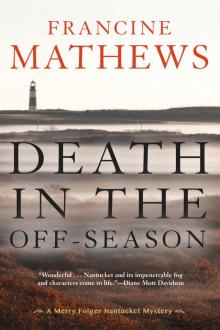 Death in the Off-Season
Death in the Off-Season Death in Rough Water
Death in Rough Water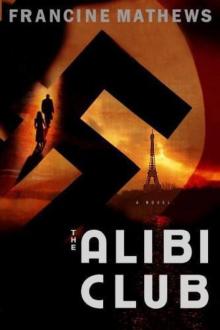 The Alibi Club
The Alibi Club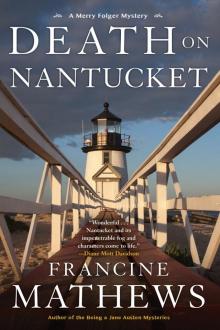 Death of a Wharf Rat
Death of a Wharf Rat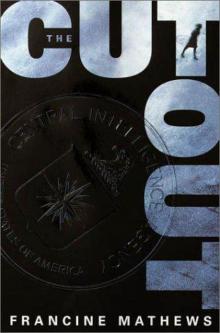 The Cutout
The Cutout The Secret Agent
The Secret Agent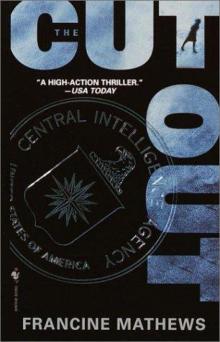 The Cutout cc-1
The Cutout cc-1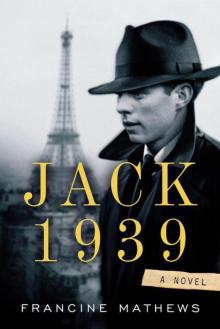 Jack 1939
Jack 1939 Death in a Cold Hard Light
Death in a Cold Hard Light Blown
Blown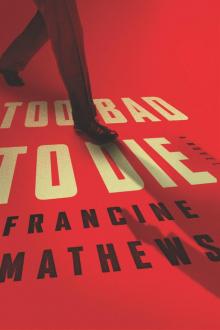 Too Bad to Die
Too Bad to Die